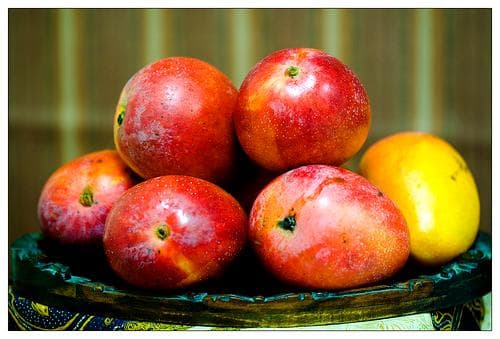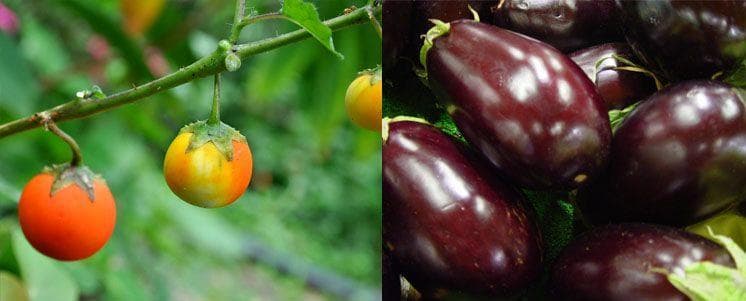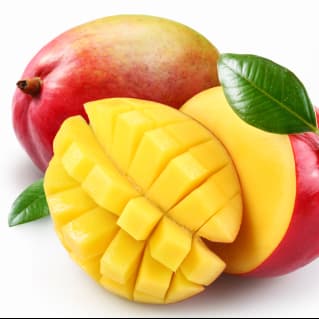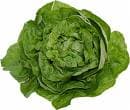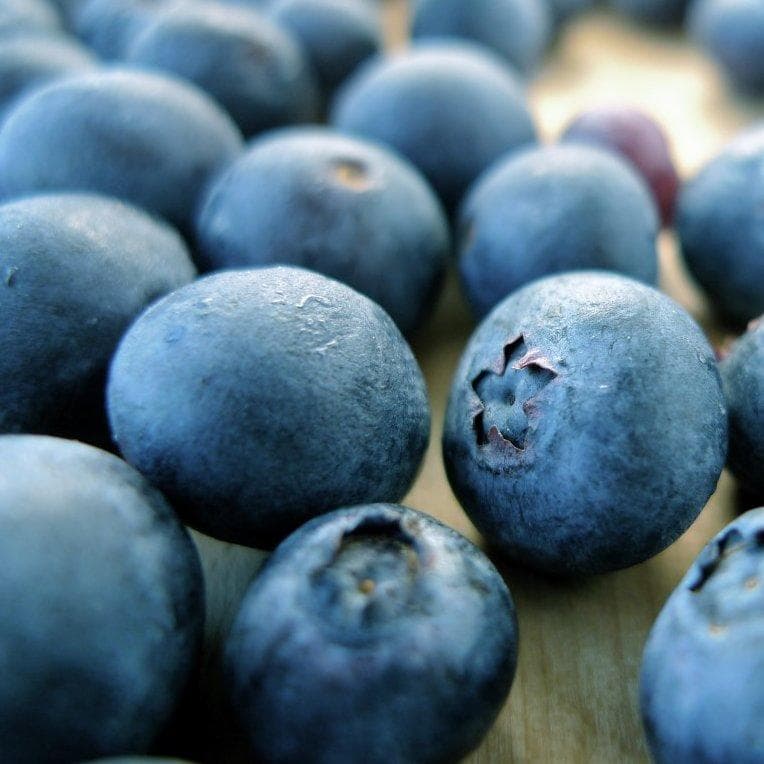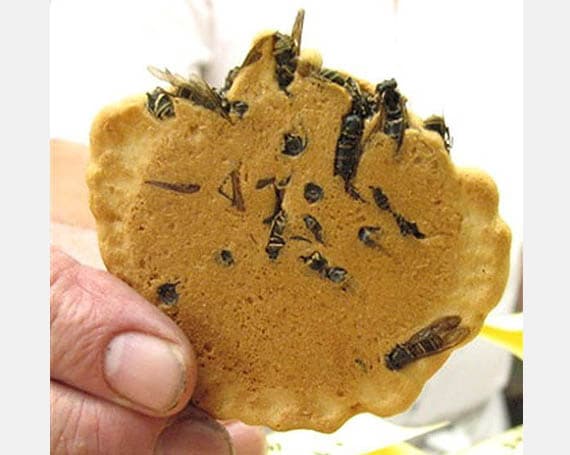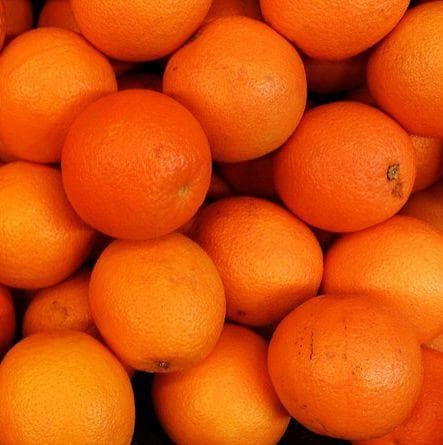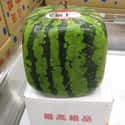-
(#7) The Appearance Of Luxury Fruit Is Hugely Important
The highly sought-after aesthetic of unusual fruit ensures that it has become desirable for farmers to strive for even more unique looks and bigger sizes. Since the food is seen as a luxury item, it's elevated the status of agriculture in Japan and has turned fruit-farming into a niche, high-end craft. As fruit is commonly gifted for important occasions, it is important that the yields have a pleasing appearance. This has prompted farmers to go to extreme lengths to ensure that the fruit looks good on the shelf. Beyond the square watermelon, Japanese luxury fruit farmers have developed the enormously luscious "ruby grapes," giant apples, and perfectly spherical melons. Stores will generally only carry very uniform-looking fruit; any odd-looking, misshapen items or fruit with marks or bruises is destroyed.
-
(#9) Perfection In Seeds Is Key To Growing Perfect Fruit
Before farmers even get to the growing stage, there is a stringent process by which they select the seeds that they use. Every single year they breed new strains, taking everything they have learned from the previous 12 months. Any seeds that have any weaknesses are discarded as the farmers try to make constant improvements. This allows them to aim to increase the size of the fruit, make them better looking, and ensure they are ever more tasteful.
The giant, lustrous ruby grapes that cost upwards of $85,000 per bunch are the result of years of meticulous development — they were first put on the market in 2008, but even before that they had been carefully crafted for some time.
-
(#4) Creating New Fruits As Novelty Items Is A Niche Career Path
The fascination that some sections of Japanese society have with fruit has inspired farmers to create innovative designs. One of the most famous is the square watermelon. While it was originally grown to be a space-saving measure, as it would fit more easily into refrigerators, it has since become a popular novelty item. The extra care that goes into getting these square melons to the market means that they are up to three times as expensive as normal watermelons. This has made it a popular status symbol among those with extra income or who want to appear fashionable.
-
(#8) A Huge Amount Of Effort Goes Into Growing The Fruit
Unlike in other parts of the world where farmers tend to focus on quantity more than quality, Japanese fruit farmers will labor to ensure that they get the most luxurious produce possible. For this process to work effectively, the growers have to limit how much fruit they can create. This gives them the time to produce things like high quality melons.
The fruit will often be grown in special greenhouses that keeps the seeds at a constant temperature and humidity for best results. The fruit will then grow uniformly, with any ones that show even minor deformities plucked. Workers are kept on constant call to adjust heaters and to provide extra water or fertilizer at any time of the day or night depending on the weather.
CNN interviewed a strawberry farmer in Japan named Okuda Nichio, who has spent years attempting to perfect his tennis-ball sized, "scoop-shaped" strawberries, known as "beautiful princess" berries. Nichio admitted,
"It's hard getting the shape of these strawberries right — they can sometimes turn out like globes. It's taken me 15 years to reach this level of perfection."
-
(#5) Fruit Is Regarded As A Luxury Item
Unlike vegetables, which are used in a huge number of Japanese dishes, fruit has always been considered something of a luxury item within the nation. The fact it is not a common food item means that it has developed a certain quality of reverence that keeps it relatively expensive. "When it comes to fruit it is still a luxurious item, not like vegetables," said fruit business owner Hiroko Ishikawa in an interview with the BBC.
"Vegetables you need for daily life but you can live without eating fruit. So if you are to buy something you might as well buy something that looks good. You don't want scarred or deformed because you are paying for the fruit. It just looks better."
-
(#1) Prime Fruit In Japan Can Sell For Tens Of Thousands Of Dollars
The demand for unique and luxury fruit in Japan has sent the industry into a craft niche, and the items sold in Japanese fruit parlors and high-end stores is significantly more expensive that those found in normal grocery shops.
However, even these are at the low end of the scale compared to the truly pricey fruit that can only be bought at special auctions. These events will have the very best produce – those fruit that have been deemed the most attractive and are part of the first-harvest, making them even more desirable. One melon managed to attract a world record price of 3 million yen ($27,000) when it went to auction.
New Random Displays Display All By Ranking
About This Tool
Muskmelon is an early-maturing thin-skinned variety of Muskmelon with wide adaptability, fruit weight of about 450 grams, good fruit setting, fruit ripening 35-40 days after fruit set, fruit light green, turning yellow at maturity, not easy to crack fruit, good uniformity, high sugar content, rich nutrition, good storage and transport resistance, like adequate light, developed Root System, disease resistance and adaptability, easy to cultivation. Planted melons taste great and are sweet to all melons. The tallest of the cantaloupes, the melon is neatly shaped and Tangy, an advantage that no other growing area has been able to match. sweetbread has a crisp, sweet and refreshing skin. The melon is fragrant, and the shape of the melon is neat, with a greenish tinge, a Pale yellow, and bright color.
The random tool generated 11 entries for the 11 most popular melon varieties in Japan. Melon fresh and juicy, thin skin thick flesh, is rich in vitamin C one of the fruits. With this tool, you can find out why the Japanese people love cantaloupes. Some people give it as a gift, some like its shape, and some like the sweet taste of the fruit.
Our data comes from Ranker, If you want to participate in the ranking of items displayed on this page, please click here.

